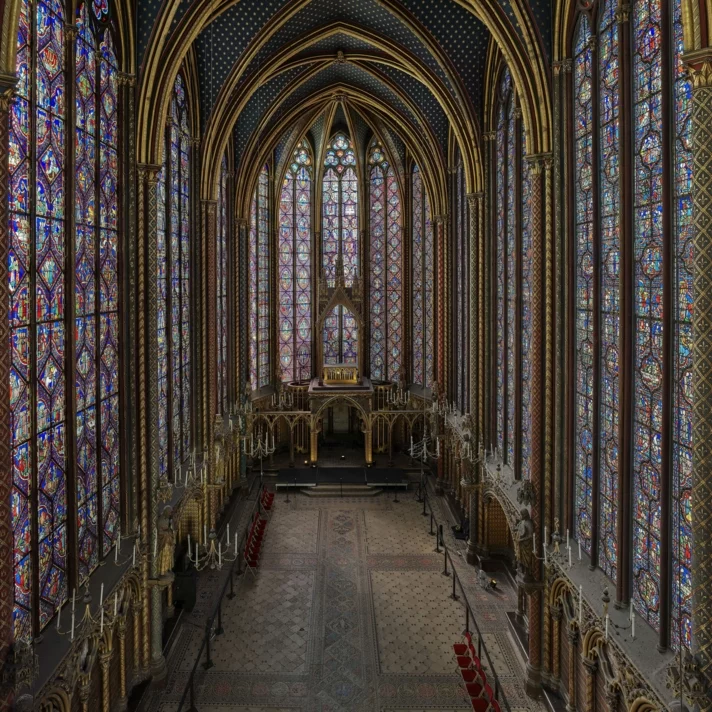A must-see
article | Reading time3 min
A must-see
article | Reading time3 min
A universe of light and colors...
Enter this extraordinary glass vessel made up of immense bays with vertiginous dimensions.
Beyond the audacious and innovative conception of the Sainte-Chapelle, what amazes at first sight is the harmonious combination of a feeling of lightness and immersion in a universe of gold and colour. The upper chapel is composed of 15 immense bays of dizzying dimensions, 2/3 of which date from the Middle Ages.
The Sainte-Chapelle is a personal commission of King Louis IX, future Saint Louis, a private chapel in the heart of his apartments in the Palais de la Cité, the first residence of the kings of France in Paris.
© Romain Pech - Centre des monuments nationaux
The fifteen 13th century stained glass windows are composed of symbolic panels, enamelled with allusions to royalty: numerous representations of coronation scenes, background and borders punctuated with fleurs-de-lis and Castilian castles, the presence of Louis IX wearing the crown of Christ, scenes of battle and idolatry, evoke the mission with which the king felt invested when he left on a crusade, after the consecration of the Sainte-Chapelle.
Don't imagine that the faithful in the 13th century lingered over each of the images you will discover, there is no need to be intimidated by the multitude of scenes presented in the Sainte-Chapelle. Stained glass windows are not necessarily meant to be read but to be seen. Bringing light into the monument!
This is the primary interest of the stained glass windows of the Sainte-Chapelle. This light, which pierces the biblical message, reminds us of its divine origin. The colouring of the glass was limited to red, blue, two greens, two purples, a yellow and a few translucent pieces to facilitate a chromatic coherence in this multitude of narrative medallions.
Philippe Berthé - Centre des monuments nationaux
1113 scenes are presented in the stained glass windows of the Sainte-Chapelle. Numerous biblical episodes are illustrated like a gigantic comic book of the Middle Ages. It begins in the north with Genesis and ends in the west with the rose of the Apocalypse.
The North and South façades constitute the "historic cycle" of the Sainte-Chapelle. The major figures of the Old Testament are illustrated here: Adam and Eve, Noah, Abraham, Moses, the kings of Israel, Joshua for the north side. Judith, Job, Esther, David for the southern side. It is on this side, in the last window, that you will see the king himself; thus becoming part of this long biblical genealogy. Worthy intercessor between his people and God.
The stained glass windows in the choir house the prophetic cycle: Daniel, Saint John the Baptist, Ezekiel, Jesse and Isaiah embrace the central window, that of the Passion, where the suffering of Christ is manifested from his arrest to Pentecost.
Bernard Acloque - Centre des monuments nationaux



